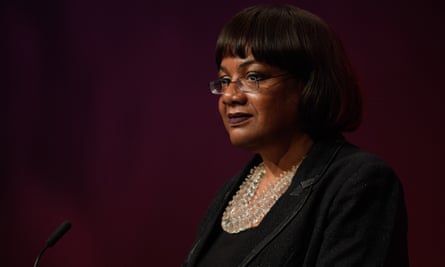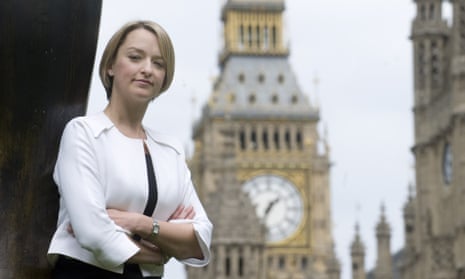Diane Abbott has called for an end to online abuse of the BBC’s political editor Laura Kuenssberg, and asked why it is female journalists and politicians that so often find themselves in the firing line.
The shadow home secretary said she was saddened to hear that Kuenssberg was being accompanied by a security guard at Labour conference after facing a backlash from some Jeremy Corbyn supporters over claims of bias.
Asked if she would call on supporters not to indulge in online abuse, Abbott, who faced more attacks than any other politician during the recent election campaign, said: “Oh definitely. Don’t do it. Just don’t do it. There is a positive case to make on Jeremy online, make that positive case. You don’t have to be abusing other people.”
The Labour party under Corbyn’s leadership had seen fantastic debate take place online, she said, “but people need to think, ‘you know what, I’m going to put out a positive tweet about Jeremy, I won’t put out something unpleasant about Laura Kuenssberg’.”
She said that Kuenssberg was “doing her job”, adding that it was interesting that female journalists tended to face more attacks that men.
“It is wrong,” Abbott said. “Laura is doing a job, I may not always like how she does the job every time, but it is her job and why – just because she is a woman journalist – does she get that level of abuse. It’s wrong.”
Abbott also warned against a possible generational divide in the party over Brexit saying: “There is a generation in the party that came of age in the [Tony] Benn era – when exiting the European Union was absolutely an article of faith. But younger people see it quite differently.” She said many were “just instinctively anti-Brexit”.
“I think the party leadership – including myself – have to be very careful, that we don’t find ourselves on the wrong side of a generational divide,” she said.
“Young people see it differently, having been born and brought up as Europeans. It is not even being pro-EU in the formal sense in terms of being pro EU structures – it is internationalism, and an outward looking approach, and being part of the EU is part of that.”

Speaking to the Guardian in Brighton where the Labour party is in the middle of its annual conference, Abbott said she was touched by the level of support she had received from party members after facing widespread hostility during the election campaign.
She said that she and colleagues on Corbyn’s wing of the parliamentary party felt vindicated by the surge in support in recent months, and felt that they had proved their critics wrong.
“We won seats no one dreamed we could win like Kensington and Canterbury,” Abbott said, arguing that Corbyn’s “enemies” had once attacked the leftwing of the party by saying their politics had no appeal to the middle classes but now were attacking them from a different direction over the working-class vote.
“People that never talked about the working class before and whose attack on the left was we had no appeal to middle-class people and now wringing their hands and saying too many middle-class people are voting for us,” she said.
She said Corbyn was in a great mood and that he enjoyed campaigning more than any predecessor, and loved travelling around the country on trains. “He buys his copy of the Railway Gazette and he is happy as Larry,” Abbot said.
She insisted that she was firmly of the view that only Corbyn could have won each of the leadership battles, calling him a “sweet tempered guy”. But she did a issue a warning on Brexit, as debate erupted on the edges of the conference over continued single market membership and free movement.
Abbott added that Corbyn wanted delegates to have more say at conference, insisting that was how it always used to be.
“When Jeremy and I first came to conference it was a delegates’ conference,” she said. “I remember in 1970s when we had gone to the IMF for a loan and [Labour chancellor] Denis Healey wanted to speak. He wasn’t allowed to speak from the platform, he had to go to the mic and they cut him off after five minutes.
“That was the really strength of feeling that you shouldn’t have cabinet members on platform. It was New Labour that turned it into a beauty parade for cabinet members.”










